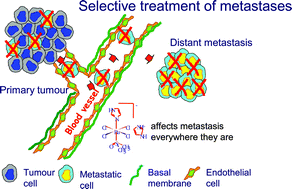Ruthenium complexes can target determinants of tumour malignancy†
Abstract
Metastases are more decisive for tumour prognosis than primary lesions, because of their multiple locations, low accessibility to surgery and/or radiotherapy, and generally poor responsiveness to chemotherapy. The metastasis should therefore be the primary target for


 Please wait while we load your content...
Please wait while we load your content...